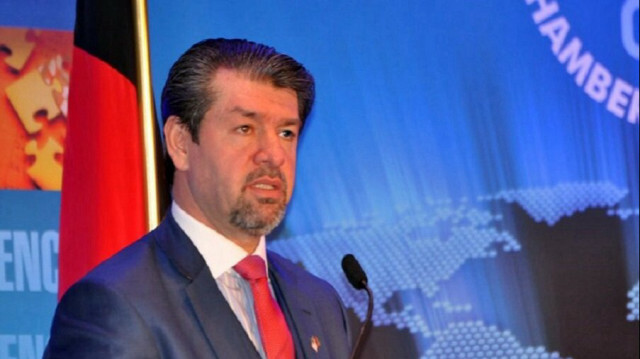

Dr. Mustafa Mastoor
‘We can do more’ for developing countries. ‘The strength is in being together,’ says Afghanistan’s Economy Minister Dr. Mustafa Mastoor
Afghanistan’s Economy Minister Dr. Mustafa Mastoor on Friday spoke to Yenişafak.com in an exclusive interview at the International Symposium on Financing for Development under the theme of "Thinking Innovative Solutions to Persist Development Challenges."
“If we want to have innovative approaches as is the theme of this conference, we need to think out of the box. We think that attracting the private sector and foreign investment will be one way to have more sustainable development, and to have more impact,” he said.
The two-day symposium that kicked off on Thursday is being organized with the cooperation of the Statistical, Economic and Social Research and Training Centre for Islamic Countries (SESRIC) and the Islamic Development Bank (IsDB).
How can developing countries that are experiencing conflicts attract the private sector?
“The private sectors in some countries where there are huge conflicts are definitely hesitating to invest. In Afghanistan, we have the local private sector and they have the capital as well and are ready to partner up with foreign investors, ready to take and share the risk, and also to invest. So that’s a good opportunity for foreign investors, when they see that the capital is there in the country and the private sector is there to partner up with them.
“If there are challenging areas, the profit of the private sector is also more. So the more courageous private sector is investing in these type of areas for a higher margin of profit,” Mastoor said.
How can we reduce the inequality between the rich and the poor?
“By the traditional donors, regional donors and regional setups: for example, the Islamic Development Bank and the Organization of Islamic (OIC) countries that we all members of can work with each other.
“In issues related to Islamic finance in particularly, if we could use the zakat fund wisely, here we may share some of what the rich has with those in need. With Islamic finance and many other approaches which these type of banks and traditional donors have already started, along with the engagement with the private sector, we will be able to reduce the inequality,” Afghanistan’s economy minister continued.
You said ‘together we can’ in your speech, do you think the South-South cooperation would be beneficial for developing countries?
“When I say ‘together we can,’ yes there are some who are richer, some who have more knowledge. Those are things to be shared with those who are in need. In terms of the South-South cooperation, at least as an expert, and now as an official who worked in this area for 16-17 years, I am not very optimistic, because it didn’t work very well; but we are not pessimistic, we are not disappointed, we can do more. The strength is in being together. So, together we can end poverty,” Mastoor said.
The South-South cooperation is a broad framework for collaboration among countries of the South which involves two or more developing countries.
How can human capital in developing countries be used efficiently?
“One way is the education and having education according to the market, so that they find jobs, because having highly-educated people without jobs is also dangerous. If the education system is according to the market, that will be an excellent way to use the potential of the young generation toward prosperity,” he concluded.

Turkey’s former Minister of Development Lütfi Elvan also spoke to Yenişafak.com and shared his opinions on issues such as public-private partnership and development in OIC countries.
“OIC countries unfortunately are not at the level that we want regarding sustainable development goals. Each country should concentrate on these goals in different sectors and aspects. International organizations such as the UN, OECD and the World Bank should really make countries aware of the importance of sustainable development goals. This is really important,” Elvan said.
“The most important thing is qualified human resources”
“Financing is important, but the most important thing is qualified human resources. We should not only concentrate on financing but also on developing human resources in OIC countries. When you look at these OIC countries, these Islamic countries, you mainly see that the quality of the level of human resources are really low,” he continued.
Turkey is a good example for OIC countries in PPP modules
“We should pay attention to public-private partnership. The private sector is much more flexible than states and governments. They can easily adapt themselves. So we should take benefit from the private sector. Especially Turkey has quite a lot of experience; it was the first country to implement public-private partnership since 1986. Turkey has been really successful in this area; it is a good example for OIC countries. We are all ready to share our experiences of PPP modules with other countries,” he said.
#Afghanistan
#economy
#SESRIC
#Islamic banking
#sustainable development
#International Symposium on Financing
#Dr. Mustafa Mastoor

